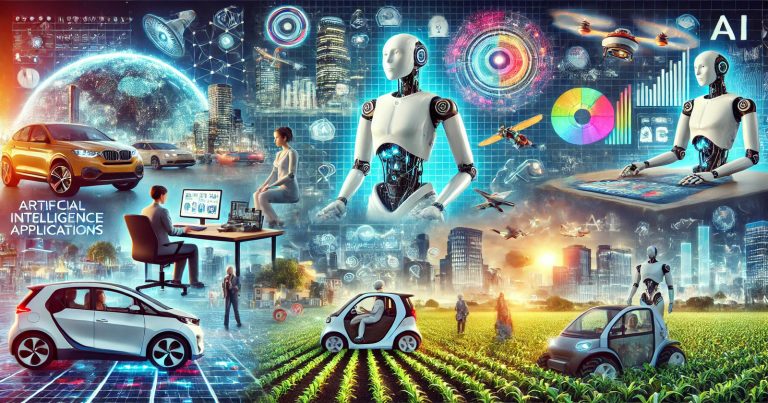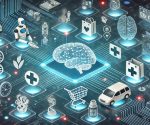Artificial intelligence (AI) enables machines to emulate human cognition. Now, it plays a role in our everyday lives. AI is everywhere, from voice assistants to smart shopping. Artificial intelligence applications have been used in many areas, such as healthcare, education, banking, farming, retail, and cyber security. They enable us to do work faster, better and safer. AI enables doctors to detect diseases, teachers to deliver better lessons, banks to detect fraud and farmers to grow more food. Outside of medical data, AI also comes in handy for law, gaming, transport and communication. In brief, AI simplifies life and makes work smarter.
What Is Artificial Intelligence?
Artificial intelligence is what makes machines intelligent. AI solves problems, gives a speech, plays the game, etc. It copies how humans think. AI covers a lot of ground, including learning, planning, natural language processing, and vision.
Applications of Artificial Intelligence
Artificial intelligence and machine learning allow computers to simulate human thought and learning. They troubleshoot, they make choices, and they learn independently of humans. AI & ML are altering the way we live, work & use technology daily.The different sectors where AI is used is given below:-
Artificial Intelligence in Finance and Banking
Finance and banking train artificial intelligence to better manage money. It monitors for fraud, assists with loans and offers advice. AI tools read big data fast. AI identifies intelligent decisions or safekeeping within banks and finance companies.
AI for Risk Checks
Banks use AI to determine whether a person can pay off most loans. Read credit scores, job information and history. Less error and fast loan approval are provided.
- AI tools to identify people unable to repay loans
- It provides warnings before a threat becomes large.
AI for Fraud Detection
- AI monitors for fraud in real-time. It searches for fake accounts, unusual spending and scams. It prevents fraud before it takes place.
- If your card is used somewhere new, an AI sends an SMS.
- It prevents the implementation of fake logins and quickly tells the bank.
- AI tools rescue crores of rupees from scamming every year.
AI in Customer Help
AI Chatbots are available for customer satisfaction 24/7. They respond to inquiries about accounts, loans and so on. AI also assists in sending offers, reminders, and alerts.
| Area | AI Application |
| Loan Processing | Fast approval and risk check |
| Fraud Detection | Real-time alerts |
| Customer Support | AI chatbots for help |
A smart banking system is made with artificial intelligence in finance and artificial intelligence in banking. It enables banks to save money and provide better service.
AI in Marketing and Retail
For example, artificial intelligence can be used in marketing and retail to improve shopping. AI knows what customers like. It serves the right ads and products. AI also assists shops with stock, prices and sales management.
AI for Smart Ads
- AI helps show ads to the right people. It analyzes what people search for and purchase. Then, it sends ads they like. This makes businesses sell more.
- AI drives You may also like in online shops.
- AI suggests an ideal time to send ads.
AI in Shopping
- AI assists with shopping apps and sites. It displays what you might purchase next. It also helps in search. Type or speak, and AI finds products.
- Chatbots assist with orders, returns and FAQs.
- AI keeps shops stocked and prices calibrated.
AI in Customer Help
AI answers questions quickly. It leads you to offers based on your taste. It is also used to rate products and search for fake reviews.
AI in marketing and retail make your shopping smart. It helps buyers save time. It enables sellers to earn more, providing better service to them.
Artificial Intelligence in Cybersecurity and Robotics
Safeguarding and Automating the Future. AI in Cyberland keeps data safe, and AI in mechanics does the heavy lifting. AI scans the internet for threats and prevents attacks. AI is deployed in factories, homes, and even outer space robots.
AI for Cybersecurity
AI finds online threats fast. It stops hackers and malware. It protects banks, schools, and companies.
- AI tools look for abnormal logins and prevent logins.
- AI updates the software before attacks can occur.
- It protects small businesses, too.
AI in Robotics
- Working safely or monotonously, AI robots are applied to work. They toil in factories, in hospitals, on farms. AI gives directives to robots about how to walk, speak and correct problems.
- Robots sweep floors, pack boxes and deliver food.
- AI robots are being explored in India for use in medicine delivery.
- AI cybersecurity and robotics do the time-consuming work, keep data safe, and assist in daily work. It secures the future and makes it astute.
Artificial Intelligence in Health Care
AI in health care is helping physicians to work more quickly and accurately. It allows for simple diagnosis and helps a doctor determine the proper treatment. They practice on a knowledge That Saves Doctors Time, Treating More Patients. AI also provides early detection of health problems before they escalate.
Smarter Diagnosis with AI
AI helps doctors detect diseases at an early stage. AI analyzes X-rays, CT scans and MRI images. It informs doctors what the problem is. This is extremely beneficial in cancer, heart diseases, and brain disorders. AI provides quick results, and it is lifesaving.
- AI tools, such as IBM Watson, are used to detect cancer.
- AI is the technology used by Google Health to read eye scans.
- AI detects skin issues using images.
- These tools allow even small hospitals to provide decent care.
AI for Better Treatment
AI aids in selecting the right treatment for each patient. It examines the patient’s medical history. Then, it tells you what medicine or care is best. AI also helps in surgery. AI-assisted robot arms aid doctors during surgery.
- Da Vinci and other robots assist in heart and brain surgery.
- This is all before AI decides if medicine is working or not.
AI in Hospital Work
Hospitals use AI in daily work. It stores health records, sends reminders and answers questions. Patients can ask AI chatbot questions at any time, saving nurses and doctors time.
| Use Case | AI Role |
| Disease Detection | Fast scan reading |
| Surgery | Robot-assisted surgery |
| Drug Discovery | Find better drugs fast |
| Patient Support | AI chatbots and alerts |
So, AI in health care helps people get better care. It lowers costs and saves lives. Hospitals are getting smarter and more helpful with AI.
Artificial Intelligence in Education
AI in education makes it fun and easy to learn. It guides teachers in understanding what students need. It provides lessons tailored to each child’s level. AI also assists with online classes, tests and grading. AI makes learning so easy and intelligent that students love it.
AI for Personalized Learning
Every child has a unique style of learning. AI assists teachers in delivering the right lessons to individual children. It examines how a student learns and assigns tasks accordingly. AI apps also aid slow learners in catching up.
- For a more lighthearted approach to AI, apps — such as Duolingo and BYJU — offer equally rewarding learning experiences.
- Tech smart apps assist in maths, reading and science.
- AI tools make it easy for teachers to check student progress.
AI in Smart Classrooms
AI makes classrooms smart. Teaching tools like smartboards, speech tools and AI chatbots allow AI to ‘read’ students’ moods and change the lesson. It helps to be more focused and interested.
- AI cameras monitor who isn’t paying attention
- Voice tools assist students with difficulties in reading or speaking.
AI in Exam and Homework
- AI assists in validating homework and examinations. It identifies errors and offers feedback. This saves teachers’ time. It can also generate quiz questions and tests in seconds.
- AI allows you to provide a better and more equitable study for everyone. It enables students to learn at their own pace. It allows teachers to create easy tools that save time.
Artificial Intelligence in Agriculture
AI helps farmers grow more food worldwide. It provides weather information, soil data and crop health. AI machines assist with planting, watering and picking. This is a big help for Indian farmers. It saves money and produces more food.
AI for Crop Planning
AI recommends the best planting and harvesting times to farmers. It researches weather, soil, and historical data. Helps in planning which crop should be cultivated.
- AI-based apps recommend high-margin crops.
- It provides rain alerts and pest warnings.
AI for Better Farming
- AI drones take farm photos. These photos indicate dry areas, disease in plants, and weed growth. AI tools can assist farmers in spraying water or pesticides only where the demand is. This is known as precision farming.
- Robots plant the seeds in the right lines.
- They check the health of the crops daily with AI cameras.
AI for Market Help
- AI assists a farmer in crop pricing. It aids storage and transport. AI apps link farmers to buyers. It advises farmers in their language.
- AI in agriculture helps India feed the country safely. It allows small farmers to earn higher incomes. It makes it smart, green and easy to farm.
Relevance to ACCA Syllabus
It focuses on strategic business leadership, audit and assurance, and performance management. Real-time decision-making, performance evaluation, and financial audits are all undergoing a revolution due to artificial intelligence applications which help ACCA students understand how AI tools are shaping up. AI enables automation in realms like internal controls, risk assessments, and ensuring the accuracy of financial reporting—all essential domains for the ACCA-qualified professional.
Applications of Artificial Intelligence ACCA Questions
Q1: What role does AI play in audit procedures in the ACCA profession?
A) By randomly sampling data
B) By improving the human ledger entries
C) With big data analysis for anomalies
D) Audit documentation replacement
Ans: C) Through analyzing large data sets for anomalies
Q2: How do AI tools assist with decision-making in performance management?
A) Tuna fish bait set aside financial ratios
B) By providing real-time performance insights
C) By changing tax rules
D) By taking legal contracts
Ans: B) Creating real-time performance insights
Q3: In which area of financial reporting do you see AI automation as having the most benefit?
A) Manual transaction input
B) Forecasting future cash flows
C) Writing IFRS standards
D) Management of physical inventory
Ans: B) = predicting future cash flows
Q4: What ACCA exam paper correlates best with learning about AI use in governance and controls?
A) STRATEGIC BUSINESS REPORTING
B) Financial Management
C) Strategic Business Leader
D) Taxation
Ans: C) Strategic Business Leader
Q5: What is one danger of using AI tools in audit without the proper human eyes on them?
A) automatic audit judgment
Q) A) Excessive reliance on judgmental sampling
Missed errors are due to algorithm bias
D) Decrease in the speed of report generation
Ans: C) Errors missed because of the bias in the algorithm
Relevance to US CMA Syllabus
Performance management, internal controls, and decision analysis are integral to the US CMA syllabus. AI applications support data analytics, predictive modelling, and automation, helping with cost management and strategic financial planning. AI has become a key tool in reducing the effectiveness of in-process audits, which has become the genesis of the CMA Part 1 paper.
Applications of Artificial Intelligence CMA Questions
Q1: How is AI enhancing internal controls on cost?
A) By replacing accountants
B) Through auto-generating ethics report
C) Identifying atypical transactions in real-time
D) By removing the need to budget
Ans: C) Real-time identification of unusual transactions
Q2: How can AI be beneficial in the performance management process for CMAs?
A) Cuts back on dashboards
B) Measures variation and predicts results more quickly
C) Only encourages manual data entry
D) Impedes flexibility in strategic planning
Ans: B) Traces variance and predicts results quicker
Q3: Which CMA topic applies AI in the assessment of capital budgeting?
A) Audit Standards
B) Internal Controls
C) Investment Decisions
D) Ethics and Regulations
Ans: C) Investment Decisions
Q4: [Judging] Which AI function best assists with CMA decision analysis?
A) Bots for emails, Robotic Process Automation
B) What-if scenarios with predictive analytics
C) Social media monitoring
D) Generating legal contracts
Ans: B) Predictive analytics for what-if scenarios
Q5: What is the unique edge of AI in managerial reporting?
A) Use of handwritten reports
B) Delay in financial closing
Immediate insight from real-time dashboards C)
D) Elimination of ERP systems
Ans: C) Real-time dashboards and immediate visibility
Relevance to CFA Syllabus
Use cases for artificial intelligence assist with investment analysis, risk modelling, and algorithmic trading. Candidates for the CFA learn how machine learning and AI influence financial markets, help with ESG investing, and improve efficiencies in valuation models.
Applications of Artificial Intelligence CFA Questions
Q1: In what way is AI used for portfolio management?
A) By issuing stock dividends
B) By automating your asset allocation strategies
C) By preparing audit reports
D) By closing accounts books inappropriately
Ans: B) Through automated asset allocation strategies
Q2: Which investment analysis task would AI tools be of the most help for?
A) Reading paper financial statements
B) Predicting corporate credit ratings
C) Filing regulatory reports
D) Calculating VAT
Ans: B) Predict company credit ratings
Q3: What kind of AI technique is frequently used in risk modelling?
A) Regression of past data
B) Blockchain mining
C) Manual ledger review
D) Tax computation
Ans: A) Regression based on historical data
Q4: In ESG investing, what can AI offer to portfolio managers?
A) In total replacement of human judgment
B) Data tracking sustainability trends with big data
C) By restricting ethical investments
D) Lessening the report transparency
Ans: B) Tracking sustainability trends in big data
Q5: How do CFA professionals use AI for equity research?
A) To count shares manually
B) For automating earnings forecast models
C) For Tax Preparation files
D. To detect fraud in real-time
Ans: B) Automate earnings forecast models
Relevance to US CPA Syllabus
The US CPA syllabus covers auditing, financial reporting, and regulation. Machine learning correlates directly with audit automation, fraud detection, and data analytic efficiency. The CPA in AICPA requires AI to impact assurance services and risk assessment.
Applications of Artificial Intelligence CPA Questions
Q1: What role does artificial intelligence play in audit data analytics?
B) It writes the audit report on its own
B) It detects irregularities and patterns in transactions
C) It overlooks control deficiencies
D) It eliminates the need for documentation
Ans: B) It helps to identify patterns and anomalies in transactions
Q2: Of the CPA exam sections, which one has the closest connections to AI in helping them evaluate risks?
A) Regulation
B) Auditing and Attestation
C) Financial Accounting & Reporting
D) Business Environment & Concepts
Ans: B) Auditing and Attestation
Q3: How is AI, as a tool, utilized for compliance, especially regulatory?
A) Forecasting rainfall
B) Monitoring transactions for suspicious activity
C) Making legal judgments
D) Setting tax rates
Ans: B) Transactions for suspicious activity
Q4: What is one huge advantage of including AI in CPA audit workflows?
A) Less access to data
B) Delayed reports
C) Continuous auditing and real-time insight
D) Completely automated without any safeguards
Ans: C) Continuous auditing & real-time insights
Q5: Which emerging area is AI most appropriately studied in CPA examinations?
A) Tax return processing
B) information technology audit and data analytics
C) Bookkeeping
D) Payroll computation
Ans: B) IT audit and data analytics


